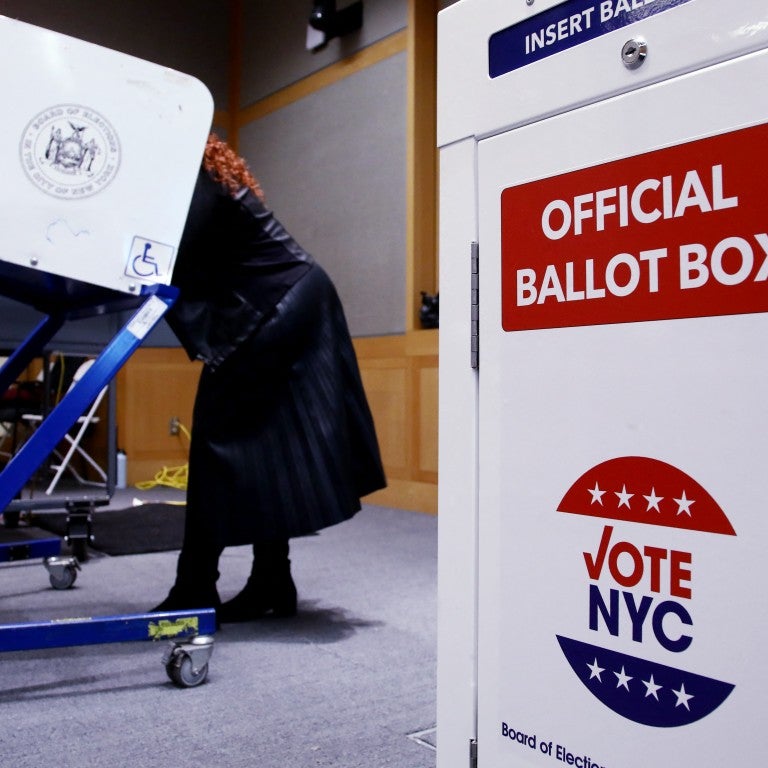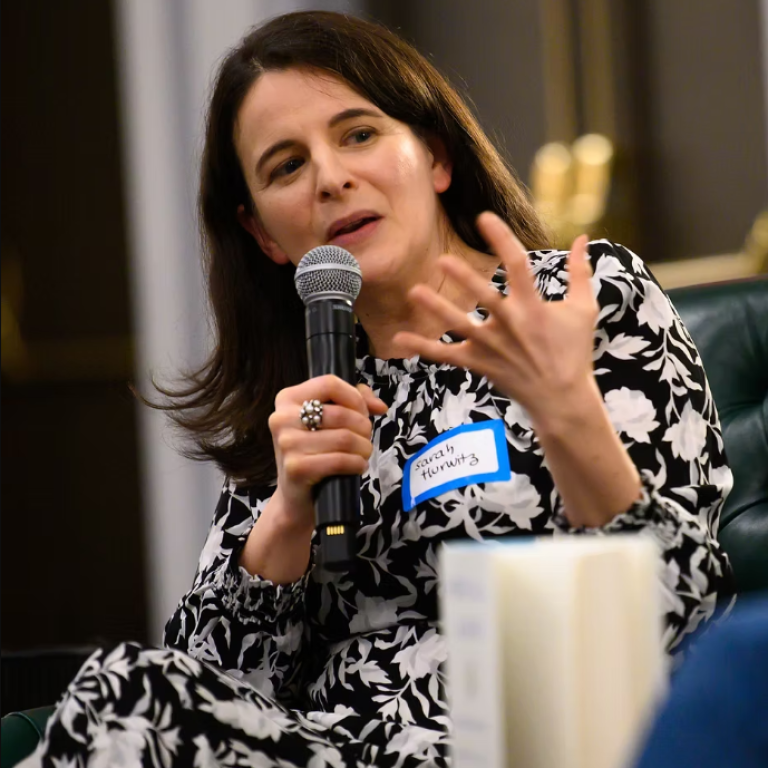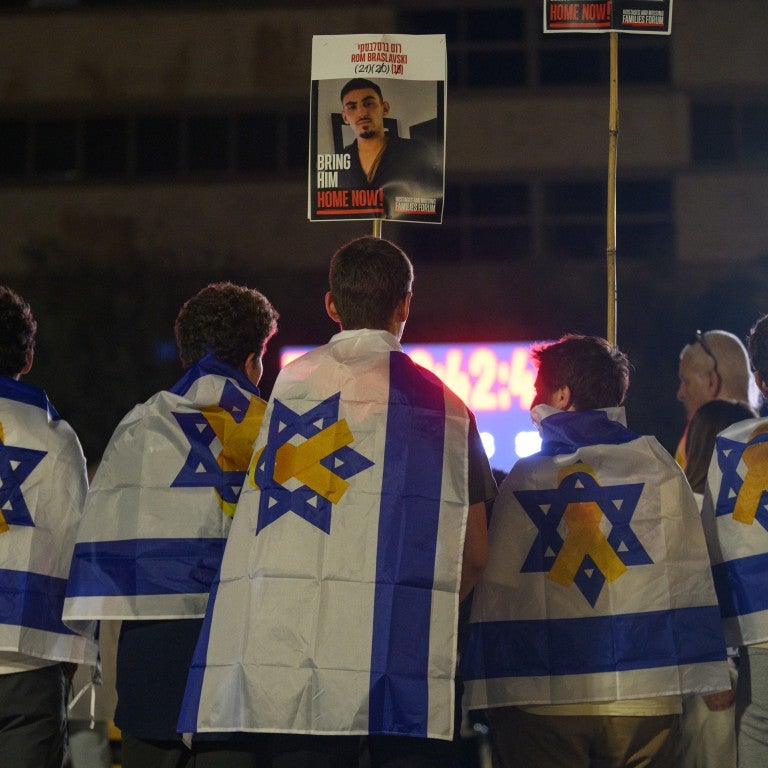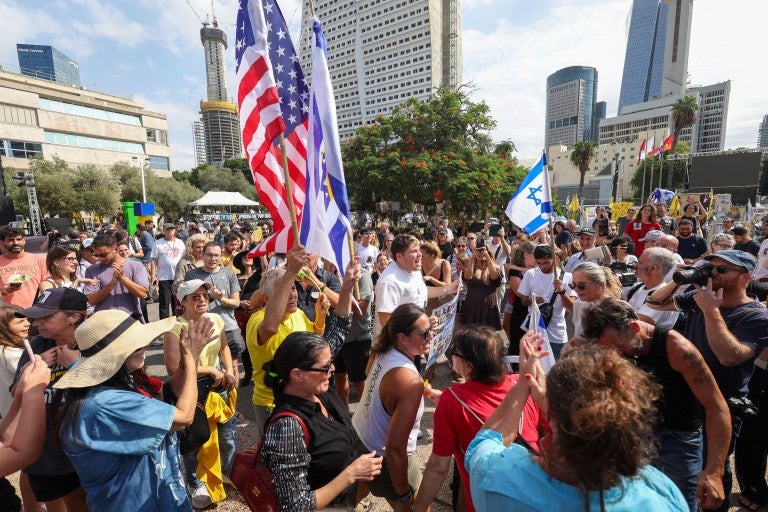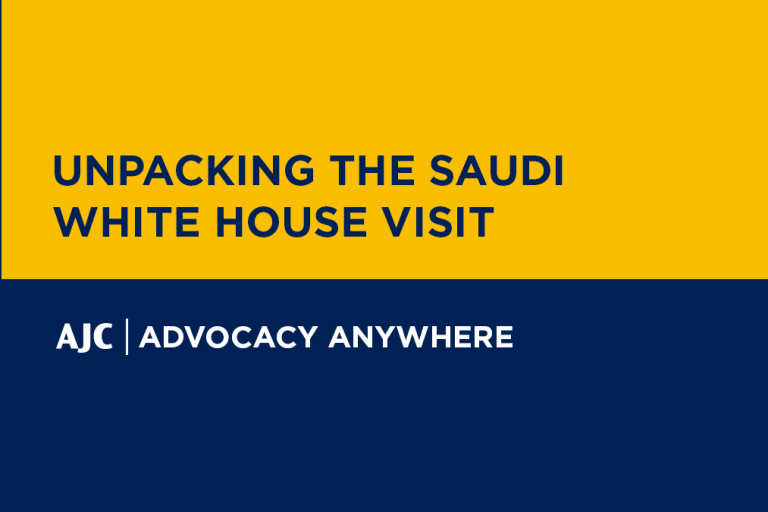February 21, 2025
Imagine being spat on as you walk across your college campus simply because you’re Jewish or being asked whether you’re a “good Jew” or a “bad Jew.”
As part of AJC’s State of Antisemitism in America 2024 Report, AJC and Hillel International partnered to document the experiences of Jewish students on campus over the past year. The findings are deeply troubling: nearly a third of Jewish students in the U.S. reported feeling uncomfortable or unsafe at a campus event because of their Jewish identity, and 43% avoided expressing their views on Israel due to fears of antisemitism.
In the second installment of this two-part series, meet two students whose experiences reflect these alarming statistics: Evan Cohen, a senior computer science major at the University of Michigan and Vice Chair of Hillel International’s Israel Leadership Network, and Daniel Solomon, a junior studying political science and urban studies at Brown University who serves on AJC’s Campus Global Board.
*The views and opinions expressed by guests do not necessarily reflect the views or position of AJC.
Resources:
- What You Need to Know About the Largest-Ever Commitment to Counter Antisemitism on College Campuses
- AJC’s Center for Education Advocacy
- Nearly One-Third of American Jewish College Students Feel Faculty Members Have Promoted Antisemitism or Learning Environments Hostile to Jews
- 5 Takeaways from AJC’s State of Antisemitism in America 2024 Report
- Go Behind the Numbers: Hear directly from American Jews about what it’s like to be Jewish in America
Test Your Knowledge:
- How much do you really know about how antisemitism affects Americans? Take this one-minute quiz and put your knowledge to the test. Start now.
Listen – AJC Podcasts:
- The Forgotten Exodus: with Hen Mazzig, Einat Admony, and more.
- People of the Pod:
Follow People of the Pod on your favorite podcast app, and learn more at AJC.org/PeopleofthePod
You can reach us at: peopleofthepod@ajc.org
If you’ve appreciated this episode, please be sure to tell your friends, and rate and review us on Apple Podcasts or Spotify.
Transcript of Conversation with Evan Cohen and Daniel Solomon:
Manya Brachear Pashman:
As part of AJC's State of Antisemitism in America 2024 report, AJC and Hillel International partnered to document Jewish students' experiences during their time on campus. Last year, the report found that 43% of Jewish college students avoided expressing their views about Israel on campus or to classmates because of fears of antisemitism. 22% of Jewish students report feeling or being excluded from a group or an event on campus because they're Jewish, and 32% of American Jewish students said they have felt uncomfortable or unsafe at a campus event because of their Jewish identity.
Here to share their perspective on the ground are two students who have become advocates for their Jewish peers. Evan Cohen, a senior computer science major at the University of Michigan, is the vice chair of Hillel International's Israel Leadership Network. And Daniel Solomon, a junior political science and urban studies major at Brown University who serves on AJC's Campus Global Board. Evan, Daniel, welcome to People of the Pod.
Evan Cohen:
I wish it was under better circumstances, but, you know, it's a pleasure to be here.
Daniel Solomon:
Thank you so much for having me.
Manya Brachear Pashman:
So gentlemen, I just read a bunch of findings from the most recent report. Do they seem too high or too low based on your national vantage points? Evan?
Evan Cohen:
So I think these findings are, sadly, not that surprising. We've seen and experienced an unprecedented amount of antisemitism over the past year and a half, give or take. Clearly, it's rising. Clearly students are experiencing this on their campuses, myself included. I definitely think that, you know, there's probably some cases where students are experiencing it more. In some cases it's less, but I think, you know, in general, it's way too high, like we should not be seeing as much antisemism on campuses.
Manya Brachear Pashman:
And Daniel, what do you think?
Daniel Solomon:
You know, the numbers seem about right. I have the opportunity of helping lead AJC's Campus Global Board, which really has a very wide perspective across the world and also across the United State. And we recently just met as a board in Lisbon where we discussed at length new trends over the past year in college antisemitism and around the world. And this really holds. We really found that this data is reflective of what we find in our qualitative experiences.
Manya Brachear Pashman:
One finding I did not just share at the beginning is that roughly 35% of American Jewish college students or recent graduates report having personally experienced antisemitism at least once during their time on campus. Did either of you have a personal encounter of your own over the past year?
Evan Cohen:
So a number of months ago, I was walking through the center of campus with a rabbi and a friend of mine, and we were spat at. And the unfortunate reality is, not only were we spat at, but when I tried to report this, I was basically told that, without identifying the individual by name, there was nothing that the university could do. And this was extremely frustrating, because we were spat at. That was a deeply upsetting experience.
It's something that no one should have to go through just for being Jewish, but the fact that there was almost nothing that could be done about it. Besides, you know, maybe you know, here's how we can support you, which was not something that I was particularly in need of. It was disappointing to see that there was no strong response to that.
Daniel Solomon:
So shortly after October 7, my friends and I in our apartment, we held a small gathering, and you know, some friends brought mutual friends, and their friends brought mutual friends, which is totally fine. And so someone who I didn't know came up to me and looked at my door frame, and I have a mezuzah on my door frame. And she said, is that your Jew thing?
Which, yes, it is, but it's called a mezuzah. And she said, Well, are you a good Jew or a bad Jew? And I said, What do you mean by that? And I knew exactly what she meant by that. She meant, are you a Zionist? Or are you an anti-Zionist Jew? And the conversation ended shortly thereafter, and we asked her if she would leave.
Manya Brachear Pashman:
This report came after the protests and the encampments that roiled college campuses, mostly in the spring of 2024 of the Jewish students who witnessed anti-Israel demonstrations after the October 7 terrorist attacks, 51% said that these protests or encampments made them feel unsafe on campus. How did your universities handle the encampments that popped up on your campuses?
Evan Cohen:
There was an encampment on our campus, it sprung up the morning of the first Passover Seder of last year. And I remember receiving a text at six in the morning or something. I woke up, the first message I saw was, Evan, Do you know what's going on? And I said, Oh my god, another thing to deal with. You know, it's about to be Passover like we're supposed to be preparing for the Seder. And, you know, I think that at our university was handled extremely poorly, you know? We were told the encampment is contained, yet it grew in size, you know.
So at first it took over the main part of the center of the Diag, which is the main center of campus area at the University of Michigan, and slowly crept out into farther and farther areas of that center of campus Diag. And it was really disappointing, because at the end of the year, when it's finally warm, students are out there, they're hammocking, they're playing sports, even just reading and studying. And at that point, there was nobody besides those in the encampment. And so it really destroyed the end of year atmosphere that everyone always looks forward to. And again, like I said, I think it was handled very poorly. The university did not contain it. The university waited until after graduation.
They were hoping, I believe they were hoping, that if they waited until after graduation, there wouldn't be disruptions at the graduation. While I personally did not graduate last spring, I had friends who did, and there were disruptions at that graduation. So clearly, that strategy did not work, did not pay off.
Sometime after graduation, they announced that the encampment was being removed because of fire hazards. Now these fire hazards were hazards the entire time the encampment was there, I saw students plugging in various electronic devices, keeping themselves warm with space heaters.
That's not something that you're supposed to be able to do there, and I do have experience, because I've had to reserve that space for, you know, pro-Israel activities in the past, and so I very much understand, first, what the rules and regulations are and how that process works. Very clearly, these rules were violated. And not only that, there was clear antisemitic imaging and speech that was spewing out of this encampment.
Daniel Solomon:
So, you know, first and foremost, our campus is a very big advocate of free speech, just collectively. So, you know, when the encampment originally went up, you know, the university made sure to emphasize the fact that, you know, it is free speech. But free speech, you know, has, you know, consequences, in the sense that setting up an encampment is against the university policy.
So, within those guidelines, you know, the encampment was up for probably a day or two, and then I remember one evening, the members of the encampment started yelling to globalize the Intifada. And this was sort of the call on the university's end to say this is actually not okay. This is when it teeters on free speech and free expression. And, you know, voicing your opinions, however different they might be than most, this is actually when it gets into hate speech. And so that's sort of the moment that our university leadership really, really took, took control of the encampment, and it ended shortly thereafter.
Manya Brachear Pashman:
Of course, most antisemitic content and the anti-Israel vitriol is primarily spread online and on social media, and the data back that up, almost seven in 10 American Jews, 67% reported seeing or hearing antisemitism online or on social media in the past 12 months. The number jumps to 83% for young American Jews between the ages of 18 and 29 so your peers, how has social media, the digital landscape, shaped your encounters with antisemitism?
Daniel Solomon:
Social media is a big part of of our generation, and a part of how we how we bond together. Similar to other universities, Brown has a platform called side chat. Other universities, they might be called Yik Yak or something else. But the only way to access this app, which is a private a private company, not, you know, affiliated with brown, but the only way to actually access the brown only channel in Sidechat is to use your Brown email. So it's sort of an anonymous message board where anyone can post whatever they feel, whatever they think. Sometimes it's funny memes. Sometimes it's satire.
In the context of the post October 7 world on Brown's campus, it was nothing, but, you know, atrocious really. It was really just a cesspool and a hotbed of antisemitism. And anti-Israel rhetoric that absolutely veered into antisemitism, but also really just classic, flat out antisemitism, you know, pointing out Jews in in, in great positions of authority in the country, and on college campuses specifically, and sort of trying to connect dots that really aren't connectable. And so Side chat was really just a really terrible hotbed of antisemitism.
And then also, you know, those who were more bold antisemites would really just blatantly, you know, leave comments in Instagram posts, you know, with their profile name visible, so you knew exactly who they are. And so, you know, the digital, the digital landscape, was absolutely a pretty crucial part of what comprised, you know, the antisemitism happening.
You know, as I mentioned before, the campus, the campus that we see now is really the one, is really the one that I that I remember, you know, in my freshman year, the one that I made some of my closest friends, on the one where I developed some of my, you know, some of my academic ambitions. The campus that I really fell in love with is the one that I'm seeing now, and much different than the situation that we were in last year.
Evan Cohen:
I could talk about, you know, two specific examples. One example was the president of our SJP chapter. Sometime, I want to say, around last March, posted something to her personal public account that said something along the lines of death to everyone who supports the Zionist state, death and more, death and worse. And I believe that Regent Acker, who was on the podcast relatively recently, actually spoke about this, I think.
And that was deeply disappointing to see, because, you know, studies have shown. I even read a study recently, I think it said that about 80% of American Jews support Israel, meaning they believe in Zionism, the right for Israel to exist safely and securely, for Jews to live there in our ancestral homeland. And so to say that, you know, that's basically calling for the death of Jews, the death of fellow classmates, fellow students. So that was, you know, extremely challenging to see and to deal with.
And ultimately, there were effectively no consequences. The student graduated last, last spring. And you know, we saw, we saw nothing, no repercussions from this, this activity. Another example of online antisemitism. What I experienced was during a trip to Israel last May. As part of this trip, I was going to be bearing witness to the atrocities of October 7, and so we were sharing, me and another student from the University were sharing some of our experiences, and a screenshot was taken of us, and then over, over, on top of it were overlaid messages like settlers scum, and these students were celebrating genocide.
Manya Brachear Pashman:
Evan, how have these encounters, both on campus with the encampments and on social media? How have they informed your time working with Hillel on an international level?
Evan Cohen:
You know, it's very clear that antisemitism is extremely prevalent. It's clear that anti-Zionism, anti-Israel sentiment, is very prevalent, and that we need to be constantly working toward combating it and supporting students on different campuses, this manifests in different ways. So it requires different tactics, different strategies, depending on what school you're at, depending on what your individual needs are.
But now being in this leadership position, it's amazing to be able to try to offer that support and use my experiences to then help other students on their campuses deal with the troubles that they are going through and what they are experiencing.
Manya Brachear Pashman:
I want to point out that a lot of this happened after the October 7 terrorist attack. A lot of what you're talking about, of course, the survey itself. But antisemitism doesn't just come from anti-Israel corners and Evan I know there were instances of demonstrators waving Nazi flags in Howell and Fowlerville outside a production of The Diary of Anne Frank. Those are small towns about 30 or 40 miles away from Ann Arbor. Have there been expressions of antisemitism from the far right on Michigan's campus? I think
Evan Cohen:
I think it was like the 2022-2023, academic year, the students received hate mail specifically targeting Jews, saying that Jews run the media, that they're responsible for COVID messages similar to that. I want to say that was even around the High Holidays timeframe. And so this was found like, you know, passed out around off campus, student housing. And so a number of students received messages like that. You know, we also saw post October 7 swastikas on or near Jewish buildings, for example, at Hillel one time. And so, you know, we're definitely seeing antisemitism from both sides.
Manya Brachear Pashman:
Daniel, your campus Antisemitism Task Force, for lack of a better term, it initially formed in response to hatred from the far right. Is that right or is that correct?
Daniel Solomon:
Yeah. So when I was a when I was a freshman, in my freshman fall, a terrible antisemitic threat was sent to the campus rabbi and executive director of the Brown-RISD Hillel that serves both Brown University and the Rhode Island School of Design, and that's sort of where we sort of came together and started really having very proactive and very productive meetings with with Brown's administration.
Partially, I, you know, I will plug just a little bit that. I think that part, you know, the reason why I was so zealous to get involved was the training I received with American Jewish Committee, with the LFT program, the Leaders for Tomorrow high school program.
So we really came together. Started having these conversations with Brown's administration, and created this really positive relationship, which I think is a pretty Hallmark component of being a Brown student, is this really, is this really great relationship that we formed? And I think that, you know, leading into October, 7, part of what made Brown's response so effective was that we had this really dynamic relationship with administrators already, and that, you know, there's really no gap in between Brown's institutional Jewish leaders and Brown's administration.
We have, you know, an incredibly supportive administration. And I think that was something that we saw following the incident and fall of 2022, and something that we continue to see all throughout you know, the post October 7 world.
Manya Brachear Pashman:
And Daniel, I'll ask you the same question I just asked Evan, how has that experience, that experience on Brown's campus, informed your time on AJC's Campus Global Board?
Daniel Solomon:
To be honest, it's actually a little bit of the opposite. I feel as though my time on AJC's Campus Global Board has really provided such an incredible opportunity to understand the global landscape of campus antisemitism. And also, of course, you know, we want to emphasize the global landscape of Jewish joy that's happening on college campuses, because that is definitely not in short supply.
Manya Brachear Pashman:
You know, I'm curious, do you get questions from your peers back home, your younger peers, questions about whether or not your campuses are the right choice, the right fit for them?
Evan Cohen:
I think it's really important to mention that the Jewish students on campus do absolutely have a home here. We're working extremely hard to ensure that there is Jewish joy on campus, and there are organizations here to support Jewish students. It's imperative that Jews come to campus, that we continue to build a supportive community and that, you know, we're not just hiding, we're not just shying away from this. We're actively working towards improving campus and campuses drastically improved in the 2024-2025 school year compared to the 23-24 school year. So, you know, we're standing strong. We're standing proud, and we're not going to back down.
There is a thriving Jewish community, and we're here to support you. We want you to come here. The University of Michigan has such a large Jewish population in part because a long time ago, the Ivy League schools had quotas on the number of Jews who could attend, and so the University of Michigan did not as such. We have a very strong Jewish community here, and I highly recommend coming here as long as you can bear, as long as you can bear and withstand the cold.
Manya Brachear Pashman:
Thank you both for joining us, and reflecting on the difficulties of 2024. May 2025 be more peaceful on your campuses.
Evan Cohen:
Thank you very much for having me.
Daniel Solomon:
Thank you for having me.

